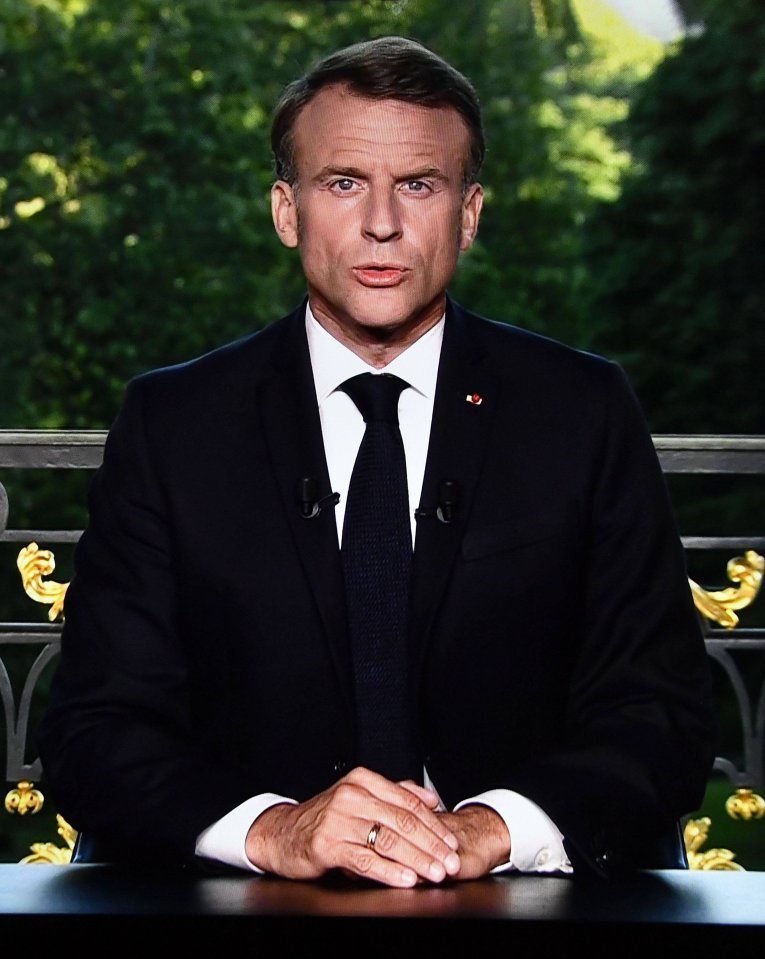THE four-day European Parliament elections are threatening to shake the EU to its core with right-wing parties making big gains in France, Italy, Germany and other countries.
The rise of the far-right saw French President Emmanuel Macron calling for a snap French election after suffering a heavy defeat to Marine Le Pen’s far-right party.
RexMacron announced that he would dissolve the National Assembly as he has warned that the far-right is threatening the future of France and Europe[/caption]
RexMarine Le Pen’s National Rally took 31.5 per cent of the vote – double that of Macron’s Renaissance coalition[/caption]
GettyHundreds of left-wing demonstrators gathered for a protest against the far-right parties at the Place de la Republique in Paris[/caption]
Macron announced that he would dissolve the National Assembly after Marine Le Pen‘s National Rally gained 31.5 per cent of the popular vote – double that of Macron’s Renaissance coalition.
The French President issued a stark warning over Europe’s future and said: “I’ve decided to give you back the choice of our parliamentary future through the vote. I am therefore dissolving the National Assembly.
“This decision is serious, heavy. But it is above all an act of confidence.”
In response, Marine Le Pen said the French people “sent a very clear message.”
She later added: “We are ready to take power if the French show trust in us.”
The party’s leader is 28-year-old Tik Toker Jordan Bardella who responded: “Emmanuel Macron is this evening a weakened president.
“The president cannot remain deaf to the message sent by the French tonight.”
Voters in France are set to return to the polls in just three weeks on June 30 and July 7.
Meanwhile, in Germany, support for Olaf Scholzs centre-left Social Democrats sank to a projected 14 per cent, behind the fiercely anti-immigrant Alternative for Germany, which surged into second place.
It was the centre-right CDU that came out victorious with 30% of the votes.
The same tone prevails in other European countries with nationalist parties dominating general elections.
In Belgium, the Prime Minister’s liberal party suffered a big hit leading Alexander De Croos to resign and sparking coalition talks to form a new government.
Despite polls predicting that the far-right, anti-immigration Vlaams Belang party would become the main political force in the country the right-wing nationalist New Flemish Alliance (N-VA) retained its first spot, with an expected 22 per cent of the votes.
De Croos’s party took less than 7 cent of the vote in the general election in a humiliating blow.
Mr De Croo said: “This is a very difficult evening for us – we have lost.
“From tomorrow I will be the outgoing prime minister. But we liberals are strong, and we will be back.”
In Italy, Giorgia Meloni’s party won more than 28 per cent of the national vote for the EU assembly, which would make it a key player in forming future alliances.
And almost-final results in Hungary showed Prime Minister Viktor Orban’s far-right Fidesz party took 44 per cent – significantly down from 52 per cent support in 2019.
The PM, who is pals with war-hungry Putin, blocked a £42million aid package for Ukraine from the EU in December 2023.
Even though centrist parties kept an overall majority in the European Parliament, across the bloc far-right parties notched a string of high-profile wins such as France, Italy and Austria.
In Vienna, Austria’s far-right Freedom Party celebrating a narrow win as the country looks forward to a national vote expected in September.
The Freedom Party took 25.7% of the vote on Sunday, finishing in first place in a nationwide election for the first time.
Freedom Party leader Herbert Kickl said in a statement that this election result means nothing less than that Austrians have made history today.
He said the party will continue to work to take the chancellor’s job later this year.
Chancellor of Austria Nehammer acknowledged great dissatisfaction, the Austria Press Agency reported.
He vowed that his party will convince voters it takes their concerns seriously over the coming months by acting against irregular migration and overregulation.
European Commission President Ursula von der Leyen, whose centre-right European People’s Party (EPP) scored top place vowed: “We will build a bastion against the extremes from the left and from the right.”
The right-wing surge could have serious implications for Europe as it could make it harder to pass legislation.
EU presidents and prime ministers will hold a summit on June 17 to take stock of the results.
They will also discuss whether to return von der Leyen to the helm of the EU’s powerful executive branch, the European Commission.
The euro has already been hit hard by political uncertainty across Europe as it fell sharply on Monday.
The euro dropped 0.6% on the dollar to $1.0733, its lowest since May 9. It also fell 0.4% on sterling to a near two-year low of 84.53 pence, and was last down 0.6% on the Swiss franc at a seven-week low of 0.9626 francs.
It comes as the UK braces for its own general election on July 4th.
EPAItalian Prime Minister Giorgia Meloni and her Brothers of Italy party were given a huge boost after winning 28 per cent of the vote[/caption]
GettyHungarian Prime Minister Viktor Orban and leader of the far-right Fidesz party took 44 per cent[/caption]
APUrsula von der Leyen vowed: “We will build a bastion against the extremes from the left and from the right.”[/caption]

